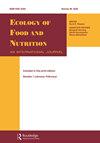尼泊尔加德满都谷地少女美食谈话探索:一项定性研究。
IF 1.3
4区 医学
Q4 NUTRITION & DIETETICS
Ecology of Food and Nutrition
Pub Date : 2024-01-01
Epub Date: 2024-01-24
DOI:10.1080/03670244.2023.2274528
引用次数: 0
摘要
本研究旨在分析居住在尼泊尔加德满都山谷的少女如何在日常经历中谈论食物。我们进行了10次深入访谈和4次焦点小组访谈。基于建构主义范式的定性主题分析被用于组织访谈。功利主义领域包含使用生物医学语言的健康声明和关于健康的世俗理论。享乐主义的谈话强调食物的味道,但关于享受的概念是有限的。集体谈话建立了一个理想的家庭。在机构谈话中,受访者描述了他们在实现苗条身材方面的积极作用。参与者并不担心粮食不安全,而是担心吃得太多。本文章由计算机程序翻译,如有差异,请以英文原文为准。
Exploring Adolescent girls' Food-Talk in Kathmandu Valley, Nepal: A Qualitative Study.
This study aimed to analyze how adolescent girls residing in Kathmandu valley, Nepal, talk about food within the context of their everyday experiences. We conducted 10 in-depth and four focus group interviews. Qualitative thematic analysis based on the constructivist paradigm was used to organize the interviews. The Utilitarian domain contained health statements using biomedical language and lay theories on health. Hedonic talk emphasized the taste of food, but notions about enjoyment were limited. Collective talk constructed an ideal family. In agency talk, the interviewees described their active role in achieving a slim body. Participants were not concerned about food insecurity but about eating too much.
求助全文
通过发布文献求助,成功后即可免费获取论文全文。
去求助
来源期刊
CiteScore
3.50
自引率
0.00%
发文量
23
审稿时长
>12 weeks
期刊介绍:
Ecology of Food and Nutrition is an international journal of food and nutrition in the broadest sense. The journal publishes peer-reviewed articles on all aspects of food and nutrition -- ecological, biological, and cultural. Ecology of Food and Nutrition strives to become a forum for disseminating scholarly information on the holistic and cross-cultural dimensions of the study of food and nutrition. It emphasizes foods and food systems not only in terms of their utilization to satisfy human nutritional needs and health, but also to promote and contest social and cultural identity. The content scope is thus wide -- articles may focus on the relationship between food and nutrition, food taboos and preferences, ecology and political economy of food, the evolution of human nutrition, changes in food habits, food technology and marketing, food and identity, and food sustainability. Additionally, articles focusing on the application of theories and methods to address contemporary food and nutrition problems are encouraged. Questions of the relationship between food/nutrition and culture are as germane to the journal as analyses of the interactions among nutrition and environment, infection and human health.

 求助内容:
求助内容: 应助结果提醒方式:
应助结果提醒方式:


